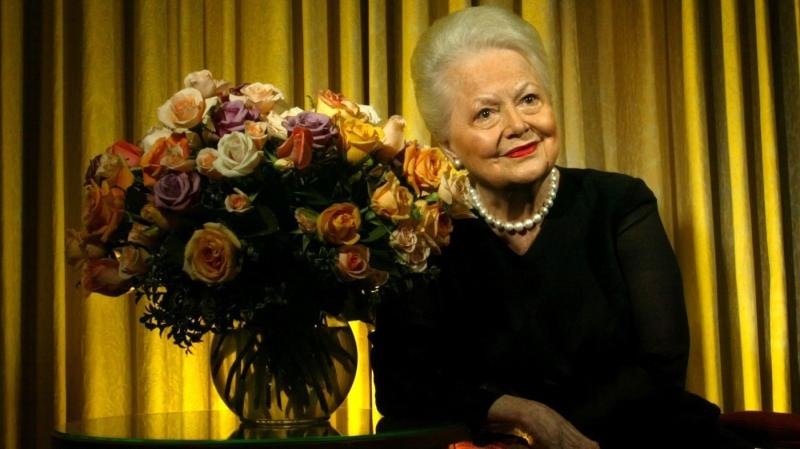At 102, Olivia de Havilland won't give up her fight over 'Feud.' Will the Supreme Court hear her case?



At 102, Olivia de Havilland won't give up her fight over 'Feud.' Will the Supreme Court hear her case?
Olivia de Havilland was more than just angry when she learned how she was portrayed in last year’s FX limited series “Feud: Bette and Joan.” The Hollywood legend felt blindsided by the show.
“Mystification and indignation,” the 102-year-old star of “Gone With the Wind,” “The Heiress” and other classic movies recalled feeling in a recent email interview from her home in Paris.
“I was furious. I certainly expected that I would be consulted about the text. I never imagined that anyone would misrepresent me.”
The two-time Oscar-winning actress is refusing to back down in her year-and-a-half-long battle with FX Networks, alleging the 21st Century Fox-owned cable network never obtained her permission and defamed her in the Ryan Murphy-produced limited series.
Despite losing her bids in a California appeals court in March and the state Supreme Court in July, the centenarian star is now petitioning the U.S. Supreme Court to consider her case. In what has shaped up to be a battle over 1st Amendment rights, De Havilland is seeking to reverse the appeals court decision so that she can pursue a jury trial.
Defamation disputes are common in Hollywood, where fictionalized dramas depicting real-life people are a staple of TV and films. Movies as recent as “The Wolf of Wall Street” and “The Hurt Locker” have been targeted by the people they portray. But De Havilland is one of the most prominent figures to take a studio to court over the way she was depicted.
De Havilland contends FX violated her own free speech rights by deliberately misrepresenting her as a profane gossip and attributing false words to her — including obscenities aimed at her sister, actress Joan Fontaine.
Though experts say the actress faces an uphill battle because she is a public figure, the major studios are watching the case closely. A victory for the star would have serious repercussions on how they make biopics and other shows.
The actress was just 27 when she risked her career by suing Warner Bros. in 1943 over her restrictive studio contract. The studio blacklisted her but she prevailed in a landmark ruling that bears her name — the De Havilland Law, which is still part of the California Labor Code and prohibits the enforcement of personal services contracts beyond seven years.
Now, De Havilland is proving once again that she is a tenacious studio adversary, even at her advanced age.
“It is essential not to give up in any struggle one undertakes,” De Havilland said, conveying some of the graceful fortitude of Melanie Hamilton Wilkes, her “Gone With the Wind” character.
FX also isn’t backing down, and last month asked the Supreme Court to pass on the case.
De Havilland’s attorneys fired back, arguing that the appeals court’s decision protects “knowing falsehoods about living persons in profitable docudramas.” The high court could make a decision as early as next month.
One of the few living stars from Hollywood’s Golden Age, De Havilland moved to France more than half a century ago for marriage and has remained there. Her life in retirement is quiet, but she stays busy, according to people close to her.
The actress lives in a luxury suite in the 16th arrondissement of Paris, in the city’s upscale western edge. She lives alone, but has assistants who come daily. They are typically young, English-speaking women, though the actress speaks fluent French . Her daily life is filled with numerous fan letters and emails.
If the weather is pleasant, De Havilland and a friend will go outside to enjoy the roof garden’s view of the Eiffel Tower. She likes to play with her fawn-colored pug, whom she named Oscar. As per the doctor’s orders, the actress is no longer allowed to have her nightly glass of champagne, instead enjoying one glass per week.
In the late afternoon, she will often receive a Skype or Facetime call from her daughter Gisele, and her son-in-law Andy, who live in Malibu.
Her associates say De Havilland can still be a witty and frank conversationalist. She is also a fighter, when the situation demands it.
At the heart of her dispute with FX is how much liberty docudramas like “Feud” can take when portraying living people. While the studio contends that dramatizations are protected by the 1st Amendment, De Havilland is arguing that “Feud” crossed the line.
In real life, De Havilland has said little publicly about Fontaine, who died in 2013, despite gossip that the sisters didn’t always get along. The FX show, De Havilland alleged, damaged her “professional reputation for integrity, honesty, generosity, self-sacrifice and dignity.”
De Havilland and her attorneys say that the case has larger implications for the power media companies wield. “The appellate court set out a rule that means everyone is at the mercy of the entertainment and news media,” said Suzelle Smith, De Havilland’s attorney. “Living people can be falsely portrayed because the public may have an interest in the story, whether accurate or a pack of lies.”
FX declined a request for comment.
Most legal experts see De Havilland’s case as a long shot, saying the Supreme Court would agree to hear the case only if it concurs that the 1st Amendment issues in question will have wider legal repercussions.
“The question before the Supreme Court is not whether the [appellate] decision was wrong, but whether it conflicts with decisions regarding the 1st Amendment in other states,” said Eugene Volokh, a professor who teaches free speech law and the 1st Amendment at the UCLA School of Law.
He said public figures don't have exclusive control over their name or likeness. “They do when it comes to commercial purposes, like advertising, but that isn’t the case here.”
In past defamation cases, courts have sided with the moviemakers.
“The Hurt Locker” case involved an Army sergeant who sued the makers of the 2009 Oscar-winning movie, claiming misappropriation of his likeness, invasion of privacy, defamation and other injuries. But a federal appeals court ruled in 2016 that the movie was protected by the 1st Amendment and contained subject matter in the public interest.
But in a separate case, a New York court ruled last year that a defamation suit involving the 2015 indie comedy “Learning to Drive” could proceed. A former New York Times columnist sued the filmmakers, claiming he was slandered by the movie’s depiction of him as a womanizer and philanderer.
De Havilland and her attorneys have argued that the 1st Amendment also protects individuals from being compelled to say or express things they don’t believe.
“It would threaten the First Amendment rights of individuals like Miss de Havilland, who would lose the ability to remain silent when television and movie producers would prefer that they speak,” her attorneys wrote in a filing last month.
The case hinges on just a few lines of dialogue in “Feud,” which FX first aired in March of last year.
The Emmy-nominated, eight-part limited series is a cat-fight soap opera depicting the professional rivalry between Bette Davis (Susan Sarandon) and Joan Crawford (Jessica Lange), focusing on their backbiting antics during the making of the 1962 movie “What Ever Happened to Baby Jane?” De Havilland, portrayed by Catherine Zeta-Jones, is a supporting character who appears in a handful of scenes.
De Havilland said she would have been open to discussion if the show’s producers had contacted her first. But she said they never did.
“I would have engaged a lawyer and have insisted that the two of us be consulted about any text which involved me,” De Havilland said. “If the actress who portrayed me had asked to meet with me, I would have agreed to do so, under proper conditions.”
Her case focuses mostly on three scenes in “Feud.” In one scene, Zeta-Jones refers to Fontaine — De Havilland’s younger sibling in real life — by saying: “You know what my bitch sister has taken to telling the press?” In another scene, she declines a movie role, explaining: “Oh no, I don’t do bitches. They make me so unhappy. You should call my sister.”
De Havilland has argued that she has never publicly referred to her sister as a “bitch.” She has admitted to calling Fontaine a “dragon lady” but maintains that the two phrases are completely different in meaning and tone. The California appeals court disagreed, ruling that the “bitch” remarks “are not highly offensive to a reasonable person and are, in addition, substantially truthful characterizations of her actual words.”
The third scene involves an exchange between De Havilland and Bette Davis. The De Havilland character makes a remark about her friend Frank Sinatra, saying that the singer must have drunk all the liquor in his dressing room.
De Havilland has argued the scene portrays her as a “vulgar gossip” and “hypocrite.” But the appeals court again disagreed.
Though De Havilland faces challenging odds, the Motion Picture Assn. of America and Netflix said the case could have a chilling effect on the way the studios make TV shows and movies.
“The MPAA and Netflix cannot overstate the serious implications that the trial court’s rulings would have for the creation of fictionalized motion pictures and other expressive works about or inspired by real people or events,” the groups said a January filing.
De Havilland wasn’t pleased with their action. “What do I have to say to them? That I am profoundly disappointed by their support of my opposition,” she said.
Early in her case, FX and Ryan Murphy tried to halt the lawsuit by invoking California’s anti-SLAPP laws, which allow a judge to strike a suit on free speech grounds. But a Los Angeles County Superior Court judge sided with De Havilland, ruling that her case could go to trial . FX won subsequent appeals in California courts. Murphy could not be reached for comment.
As De Havilland awaits the Supreme Court’s decision, she continues with her daily life in relative privacy. An assistant is currently reading to her a biography of Ginger Rogers.
Last year, she was made a dame of the British Empire, the oldest living person to receive the honor. De Havilland was born in 1916 to British parents in Tokyo, but moved as a young girl to northern California, growing up in Saratoga.
When asked what accounts for her willingness to battle with Hollywood studios — Fox now, Warner Bros. then — De Havilland offered a succinct explanation.
“It is only natural for me to take on these institutions because they are in error.”



More power to her, staying alert and engaged with what is going on in her life at the age 0f 102. I always like Olivia deHaviland, and she was of course the most sympathetic character (Melanie) in the movie Gone With The Wind.
Also, if you have never seen The Heiress, which is a psychological mystery starring deHaviland and Montgomery Clift made in the 1940's, that is also an excellent film with her.
Hell, any movie with her in it was excellent.
I agree. She and Barbara Stanwyck are probably my favorite actresses from that generation.
"The Heiress" is a great movie
Great minds think alike.
Time to roll up the pant cuffs.
She's pretty hot for 102.
Oh wait, that picture is from 2004. So she was was what? 88?
Hell, pretty good for 88.